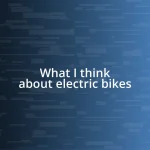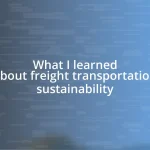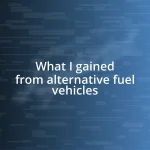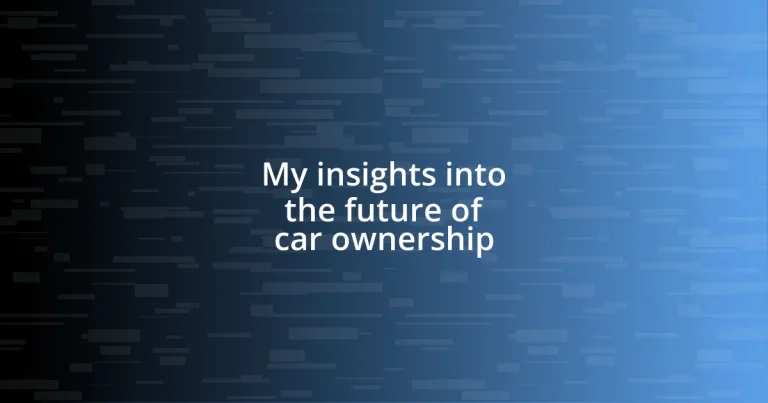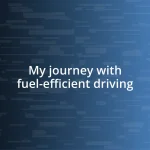Key takeaways:
- Shift toward shared mobility and subscription services is redefining car ownership, emphasizing flexibility and convenience.
- Adoption of electric and autonomous vehicles is transforming transportation, improving efficiency and reducing environmental impact.
- Growing focus on sustainability is influencing consumer choices, leading to a potential decline in traditional car ownership models.

Future of Car Ownership Trends
The trend toward shared mobility is gaining momentum, reflecting a shift in how we view car ownership. I remember the first time I tried a car-sharing service; it felt incredibly liberating not to own a vehicle, yet still have the freedom to drive when I needed to. Isn’t it fascinating to consider how many people might share that initial hesitance but find joy in the convenience of on-demand access?
As technology advances, the rise of electric and autonomous vehicles will likely redefine not only ownership but also our relationship with cars. I often think about the thrill of sitting in a self-driving car while reading my favorite book or catching up on work. Can you imagine that kind of efficiency affecting our daily lives? It makes me ponder whether we’ll start viewing cars as tools rather than possessions.
Moreover, the subscription model for vehicle access is emerging as a compelling alternative to traditional ownership. I’ve had friends who embraced these services and discovered that they enjoy the flexibility of changing cars based on their mood or needs. What if this flexibility becomes a norm, letting us select the perfect vehicle for any occasion without the long-term commitment? The possibilities are truly exciting!

Shifts in Consumer Preferences
As I observe trends in consumer preferences, it’s clear that there’s a growing desire for convenience and flexibility in transportation. The concept of ownership is evolving; people are gravitating toward options that require less commitment. I remember talking to a friend who sold her car to rely solely on ride-sharing and public transportation. She found that she spent less time worrying about maintenance and expenses, allowing her to focus on experiences that truly mattered to her.
- Increasing interest in shared mobility options over traditional car ownership.
- Rising popularity of electric vehicles driven by environmental concerns.
- A shift toward subscription services for flexible vehicle access.
- Younger generations prioritize experiences over ownership, valuing convenience.
- Interest in autonomous vehicles for their potential to redefine personal time usage.
This transformation is not just about saving money; it’s a lifestyle shift, an embrace of freedom and sustainability. It intrigues me to think about how these changes will shape our cities and our daily lives in the near future.
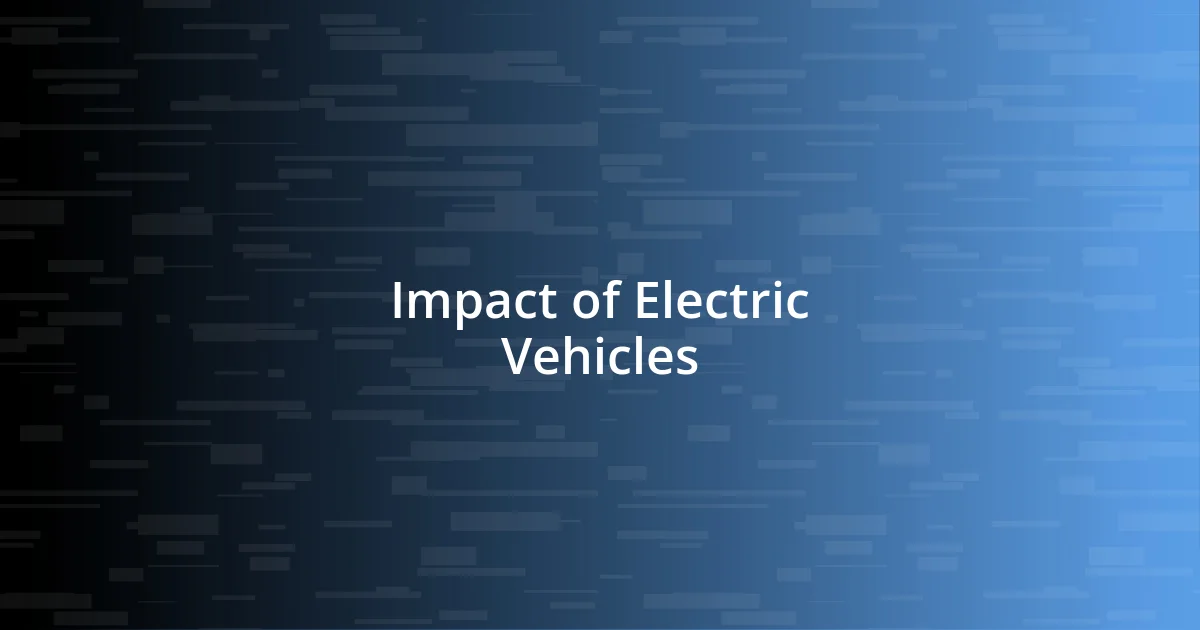
Impact of Electric Vehicles
Electric vehicles (EVs) are playing a pivotal role in reshaping our transportation landscape. When I first drove an EV, I couldn’t believe how silent and smooth it was compared to traditional cars. That experience opened my eyes to the idea that driving can be a more enjoyable and less stressful activity. I now find myself thinking about how the low emissions from EVs contribute to cleaner air, particularly in urban areas where pollution is a significant concern.
Moreover, the impact of charging infrastructure is a crucial factor in the adoption of electric vehicles. Recently, while traveling, I noticed the increasing number of charging stations popping up in various locations. This change encourages EV ownership, as it alleviates the concern many potential owners have about range anxiety. It’s comforting to know that, unlike fossil-fuel cars, we won’t be on the hunt for a gas station; we’ll be able to charge our cars while grabbing a coffee or running errands.
As I dive deeper into the topic, it’s evident that the shift to electric vehicles has broader implications for car ownership. For instance, I’ve spoken with friends who own businesses and are contemplating switching their company fleets to EVs. They’re excited about the potential savings on fuel costs and maintenance while also embracing sustainable practices. It makes me consider how businesses will increasingly incorporate environmentally conscious decisions as part of their brand identity.
| Aspect | Traditional Vehicles | Electric Vehicles |
|---|---|---|
| Emissions | High | Low |
| Fueling | Gas stations | Charging stations |
| Maintenance Costs | Higher | Lower |
| Driving Experience | Noise and vibrations | Quiet and smooth |
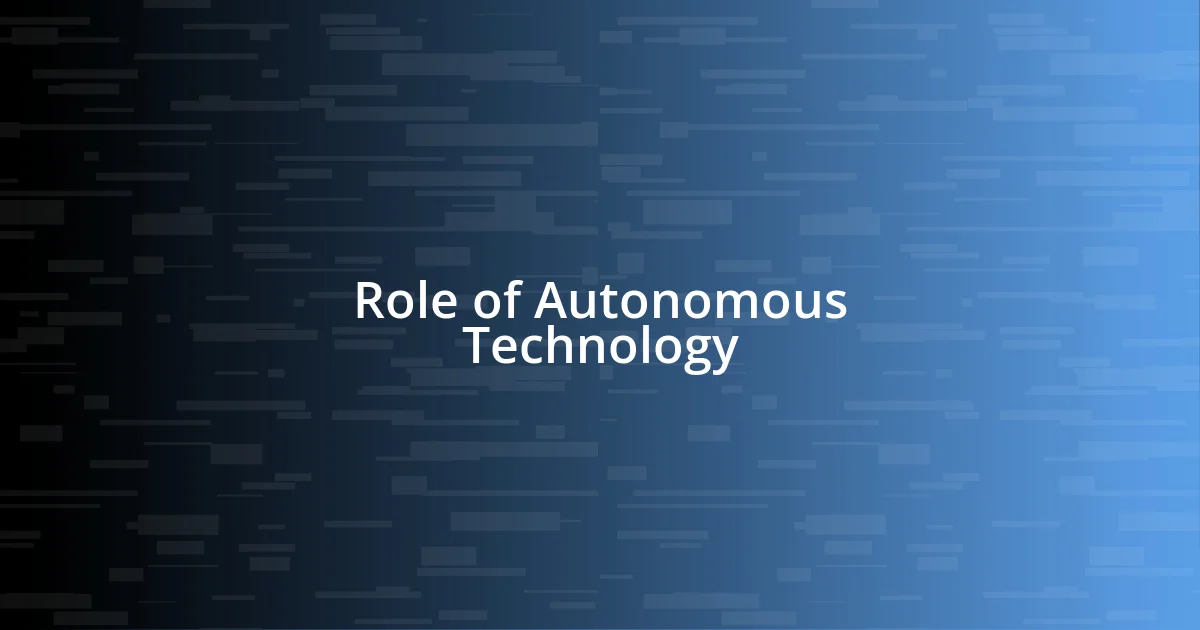
Role of Autonomous Technology
Autonomous technology is at the forefront of transforming our daily travel experiences. I remember the thrill I felt during a test ride in an autonomous vehicle; it was like being in a sci-fi movie. As the car navigated through traffic seamlessly, I pondered how this could redefine my relationship with driving—no more stress, just time to relax or catch up on work. Doesn’t the idea of reclaiming that time resonate with you?
The potential of autonomous vehicles goes beyond just convenience. They can greatly enhance road safety by minimizing human errors, which are often the culprits in accidents. I’ve read various reports about how autonomous systems use advanced sensors and AI algorithms to detect obstacles and react faster than human drivers can. Could this technology be the key to significantly reducing road fatalities? It certainly seems that way to me.
Moreover, as we embrace autonomy in our vehicles, the implications for ownership are fascinating. I often find myself contemplating how many families might choose to forgo car ownership altogether, opting for on-demand services instead. Imagine the changes in our urban environments—fewer parked cars, more green spaces, and less congestion, allowing us to enjoy our cities in new ways. Who wouldn’t want a more refreshing and open neighborhood?

Emergence of Car Subscription Services
The emergence of car subscription services is revolutionizing the way we think about vehicle access. A few months back, I decided to test out a subscription service for a month. It was amazing how easily I could switch between different models—one week I was zipping around in a compact car, and the next, I was exploring the open road in an SUV. This flexibility made me wonder: Could this be the future solution for people who crave variety without the commitment of ownership?
What struck me most during my experience was the convenience and reduced stress that subscription services provide. I didn’t have to worry about maintenance, insurance, or depreciation, which are often major concerns for car owners. I remember feeling liberated, almost as if I had shed the burdens of traditional ownership. Isn’t it refreshing to think that cars could be viewed more as tools for our lifestyle instead of long-term commitments?
The appeal of car subscription services seems to resonate especially well with younger generations, who value experiences over possessions. I’ve chatted with several millennials who appreciate being able to pay only for the cars they use when they need them. This trend reflects a broader shift towards sharing economies and could lead us to rethink not just how we drive, but how we perceive ownership itself. What if the idea of owning a car fades away entirely?
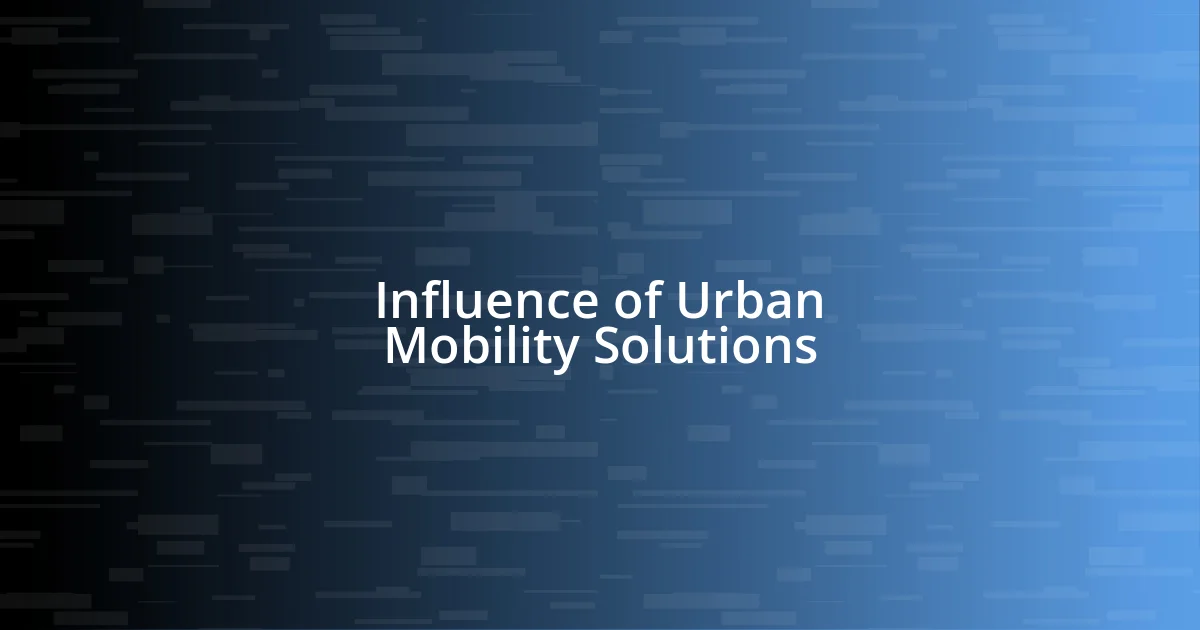
Influence of Urban Mobility Solutions
Urban mobility solutions are reshaping how we navigate our cities, and I’ve witnessed this evolution firsthand. Recently, I took advantage of a bike-sharing program during a weekend getaway. It was exhilarating to glide past traffic jams, breathing in the fresh air while being active. I realized that such solutions not only make getting around more efficient but also encourage a healthier lifestyle. How often do we overlook the simple joy of movement in our daily commutes?
With the surge of ride-sharing apps, I find myself pondering the implications for car ownership. Just last year, I gave up my second car and relied solely on these services. It was liberating—no more worrying about insurance or maintenance. Instead, I invested that money into experiences, like dining out and traveling. Could this shift in mindset point toward a future where public and shared transportation becomes the norm, rather than the exception?
I can’t help but think about the urban landscapes we’re cultivating through these innovative solutions. Fewer cars on the streets mean less pollution and more space for parks and recreational areas. When I walk through my city and see families enjoying those spaces, I feel hopeful about the direction we’re headed. Isn’t it thrilling to imagine a city where everyone can have access to vibrant, pedestrian-friendly spaces? The potential for a cleaner, more communal urban environment is closer than we realize.

Sustainability and Its Effects
Sustainability has become a pivotal factor in how we approach car ownership, and my perspective has certainly evolved. I remember driving through a neighborhood with electric vehicle charging stations dotted along the streets. It got me thinking—how much easier would it be to own an electric car knowing I had convenient access to charging? This simple fact reveals how sustainability is not just a trend; it’s reshaping our cities and the way we drive.
As someone who has embraced eco-friendly practices in my daily life, I’ve noticed a growing interest in hybrids and electric vehicles among friends and family. One such friend recently made the switch and happily told me about the savings on fuel and maintenance costs. It struck me that making sustainable choices doesn’t just benefit the environment; it also makes financial sense. Isn’t it encouraging to see these choices empowering people to rethink their transportation needs?
Reflecting on my experiences, I see a clear connection between sustainability and the future of car ownership. When I shifted to a more sustainable lifestyle, I began to appreciate the role of shared resources. It almost felt like a community effort; every time I opted for a ride-share or public transport, I was contributing to a larger cause. Could this collective effort lead us toward a society where car ownership becomes less necessary, paving the way for a more sustainable future?


